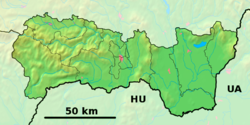Rožňava (Hungarian: Rozsnyó, German: Rosenau, Latin: Rosnavia) is a town in Slovakia, approximately 71 kilometres (44 miles) by road from Košice in the Košice Region, and has a population of 19,182.
Rožňava | |
|---|---|
Town | |
 Town center | |
| Motto: Mesto s výhľadom | |
| Coordinates: 48°39′30″N 20°31′51″E / 48.65833°N 20.53083°E | |
| Country | |
| Region | Košice |
| District | Rožňava |
| First mentioned | 1291 |
| Government | |
| • Mayor | Michal Domik |
| Area | |
• Total | 45.62 km2 (17.61 sq mi) |
| Elevation | 306[2] m (1,004[2] ft) |
| Population (2022)[3] | |
• Total | 17,122 |
| • Density | 380/km2 (970/sq mi) |
| Time zone | UTC+1 (CET) |
| • Summer (DST) | UTC+2 (CEST) |
| Postal code | 048 01[2] |
| Area code | +421 58[2] |
| Car plate | RV |
| Website | www.roznava.sk |
The town is an economic and tourist centre of the Gemer. Rožňava is now a popular tourist attraction with a beautiful historic town centre. The town is an episcopal seat. It has above all food, textile and remnants of mining industries.
History
editArchaeological finds show that the region was densely settled by miners as early as around 1200. The first written mention stems from 1291, the royal free town status from 1410. The Roman Catholic diocese of Rozsnyó was founded in 1776.
In the Middle Ages, Rozsnyó was a prosperous mining town for gold, silver, and iron. Mining activities stagnated from the 16th century (when territories to the south of the town were conquered by Ottoman Turks). Mining - this time mainly of iron ore - was renewed around 1800 and was present in the town throughout the 20th century. It was ruled by Ottoman Empire as part of Filek sanjak (Its centre was Rimaszombat) during periods of 1554-1593 and 1596–1686. It was known as "Rojna" during Ottoman period.
The name of the town probably derives from the German word for rose (Rose, in the German name of the town "Rosenau"). Until 1920 it was part of Gömör és Kishont County of the Kingdom of Hungary, and again from 1938 to 1945.
During World War II, Rožňava was captured on 23 January 1945 by troops of the Romanian 4th Army, acting as a part of the Soviet 2nd Ukrainian Front.
On 13 September 2003, Rožňava was visited by Pope John Paul II.
Noteworthy buildings
edit- an important Mining Museum
- a completely preserved medieval central town square with burgher houses
- the Cathedral (Gothic, late 13th century) with many precious historic art objects, especially a Renaissance painting of Mestercia showing realistic mining motifs, as well as the body of St. Neith, a catacombs Saint.
- the Town Tower (Renaissance, 1654) in the middle of the central town square
- the Jesuit church (Baroque, 1687)
- the Bishop's residence (Baroque-Classical, arose 1778 from older houses) with a plague column in front of the building
- a town hall (Classical, 1711)
- an Evangelic Lutheran church (Classical, 1786)
- a Reformed church (neo-Gothic, 1905)
Demographics
edit| Year | Pop. | ±% |
|---|---|---|
| 1970 | 11,075 | — |
| 1980 | 14,901 | +34.5% |
| 1991 | 18,632 | +25.0% |
| 2001 | 19,261 | +3.4% |
| 2011 | 19,706 | +2.3% |
| 2021 | 17,569 | −10.8% |
| Source: Censuses[4][5] | ||
According to the 2001 census, the town had 19,261 inhabitants. 69.27% of inhabitants were Slovaks, 26.80% Hungarians, 1.59% Roma and 0.69% Czechs.[6] The religious make-up was 41.08% Roman Catholics, 32.34% people with no religious affiliation, 12.03% Lutherans and 1.33% Greek Catholics.[6] According to the 2021 census, its inhabitants were 70.36% Slovak, 18.77% Hungarian, 0.95% Roma and 0.36% Czech; the remaining 9.56% inhabitants were of other groups.[7]
Notable citizens
edit- Haviva Reik (1914 – 1944), Jewish resistance fighter
- Vladimir Oravsky (born 1947), writer, director
- Martin Simon (born 1975), composer and guitarist
- Stanislav Stolárik (born 1955), Bishop of Rožňava (since 2015)
- Adam Szentpétery (born 1956), artist.
- Dana Velďáková (born 1981), triple jumper
- Jana Velďáková (born 1981), long jumper
- Henrieta Farkašová (born 1986), gold medal winner at the 2010 Winter Paralympics and at 2014 Sochi Paralympics
Parts of the town
edit- Nadabula
- Rožňavská Baňa (Rožňava Mine)
Twin towns — sister cities
edit- Bačka Topola, Serbia
- Český Těšín, Czech Republic
- Cieszyn, Poland
- Lipótváros (Budapest), Hungary
- Szerencs, Hungary
- Baia Sprie, Romania
References
edit- Notes
- ^ Statistical Office of the Slovak Republic (www.statistics.sk). "Hustota obyvateľstva - obce". www.statistics.sk. Retrieved 2024-02-08.
- ^ a b c d "Základná charakteristika". www.statistics.sk (in Slovak). Statistical Office of the Slovak Republic. 2015-04-17. Retrieved 2022-03-31.
- ^ Statistical Office of the Slovak Republic (www.statistics.sk). "Počet obyvateľov podľa pohlavia - obce (ročne)". www.statistics.sk. Retrieved 2024-02-08.
- ^ "Statistical lexikon of municipalities 1970-2011" (PDF) (in Slovak).
- ^ "Census 2021 - Population - Basic results". Statistical Office of the Slovak Republic. 2021-01-01.
- ^ a b "Municipal Statistics". Statistical Office of the Slovak republic. Archived from the original on 2007-12-17. Retrieved 2007-12-28.
- ^ "Ethnic composition of Slovakia 2021". Retrieved 18 March 2023.
- ^ "Medzinárodné vzťahy" (in Slovak). Rožňava. Retrieved 2019-09-03.
External links
edit- Media related to Rožňava at Wikimedia Commons
- Official website (in Slovene)
- Rožňava
- Information on Rožňava and the Gemer region
- Information on tourist sights (with photo of the main square)
- Medial information site about life in Rožňava (in Slovak)


